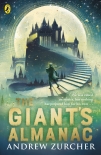The Giant's Almanac, Andrew Zurcher [accelerated reader books txt] 📗

- Author: Andrew Zurcher
Book online «The Giant's Almanac, Andrew Zurcher [accelerated reader books txt] 📗». Author Andrew Zurcher
‘This was not a case. I did not set you a case.’
‘Then who did?’ Fitz replied.
‘I tried to get to him. Without the diamond – I could reach every other room but this – I couldn’t – I fell from the roof –’
‘Is he dead?’
The Jack turned back to the folded child. With his good arm he plucked Russ from the trunk and laid him, as delicately as if he were spun of silk, or gossamer, over his shoulder.
‘This is what comes of helping that halfwit of a Master’, he said. He didn’t raise his voice, but his anger, sharp and drawn, might have cut stone. ‘They’re trying to get to me, to warn me. But they have gone too far. My apprentice cannot die. I will not allow it.’
And on those words, he turned from the children and stalked down the Helix and out of the Jackery, trailing his shattered arm behind him.
9
The Disillusioners
In the end, Russ was fine. The Commissar put him on a strict diet of broth, and kept him in the Commissary under surveillance until his colour had returned. Each of the Prents, including Fitz, stole in between their afternoon lessons, as by day they passed around the courts of the Heresy, to bring him diversions: jokes, news, and so many little objects that his window sill in the Commissary’s infirmary looked like a cabinet of curiosity: pebbles, flowers and dried herbs, cheap gems, an arrow (‘for luck,’ said Dolly, awkwardly), two lockets, a piece of narwhal tusk, bones – the heap of plunder kept on growing till Russ insisted they stop.
The Jack, by contrast, was never quite the same again. Fitz noticed at Feeding how the big Off’s eyes watched his colleagues at every meal, from time to time scanning the hall, quick with a new distrust. He was prone to anger, and, like the Master, seemed to be growing ever more haggard. Fitz could see the evidence on his face of the long vigils he must have been keeping – studying, perhaps, or pacing the courts in the darkness. The other Offs all sensed it, and the Prents; Fitz imagined that even the Fells and Serfs, where they fed in the lower hall, seemed increasingly subdued, as if day by day a cloudy pall were settling on all of them.
And yet, at the same time, perhaps even because of that, he found his lessons enthralling, invigorating, like blissful dreams from which he cried to wake. He had come to the Heresy for Clare’s sake. This was a certainty to which he clung like lichen to a rock. He pictured her back in the cottage by the Old Friary, at work in her garden, the trees blowing with their indistinct murmur beyond the defensive hedge, festooned with bindweed and blackberries. He longed for her to be able to return there, for things to go back to the way they were – before the letters, before loud voices in the night, before the fire. Before all this. The Heresy was always a means to an end, to that end; and he often – when no one was looking – took the little silver jay between his fingers, and reminded himself that he wanted to go home, that he wanted them both to go home. But new thoughts and new feelings, like weeds that will grow anywhere, seemed to take root in him and thrive. Although he couldn’t say it – he wouldn’t say it – nevertheless he felt that he loved this new place, its rituals and appointments and patterns and rules, its lessons and conversations. Every day the enchantment seemed more than the day before. Fitz couldn’t make sense of it. He couldn’t admit it. But he felt it. And then it took him over completely.
The enchantment. It stole on like a dream in sleep – from nowhere, out of time, disconnected to everything but itself. It encompassed him, swaddling him in a drowse, in a quiet, in a fullness. He forgot he had ever known anything else.
After three weeks of working in the Keep with Dina, during which time – judging from the position of the sun in the oriel window beside him – it was always early morning, Fitz put down his brush and placed his hand on his stomach. He felt well, healthy, as if he had just eaten, but he couldn’t remember having stirred from his chair. Through the low arched doorway at the end of the library, he could see scores of his paintings hanging in the workshop; along the wall in the print bins, he knew, hundreds more – all now dry – were carefully filed in chronological sequence. He knew the subject of each of them, for it was the same subject he had painted again and again, and he recalled the exacting precision with which he had worked out these studies from memory, composing in green, in brown, in slate grey, examining the light as it drifted through the trees’ canopy in the height of summer; the motion of the wind during fierce storms, which broke down the brittle growth and sometimes cleared large patches of the wood; the lives of the silent creatures that made their home in the forest, from the ants and beetles, the worms and lice to which the soil and leaf mould provided shelter, to the birds and squirrels, mice and in the ditches rats that picked, scratched and burrowed among the fallen and the live trees, to the occasional larger animals that passed through when he himself had grown silent and still enough to observe them – badgers and stoats, deer, and once a wild boar. Fitz had





Comments (0)